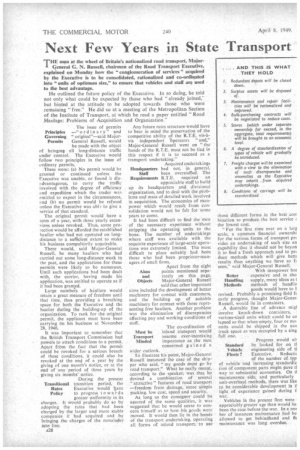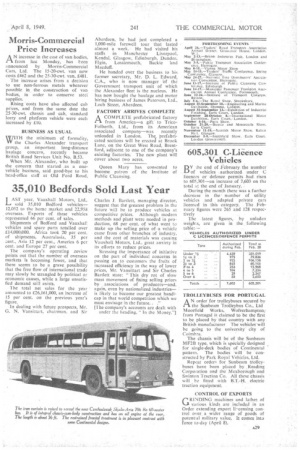Next Few Years in State Transport
Page 4

Page 5

If you've noticed an error in this article please click here to report it so we can fix it.
T'HE man at the wheel of Britain's nationalized road transport, Major' General G. N. Russell, chairman of the Road Transport Executive, explained on Monday how the "conglomeration of services" acquired by the Executive is to be consolidated, rationalized and co-ordinated into "units of optimum size," to ensure that vehicles and staff are used to the best advantage.
He outlined the future policy of the Executive. In so doing, he told not only what could be expected by those who had "already joined,but hinted at the attitude to be adopted towards those who were remaining "free." He did so at a meeting of the Metropolitan Section . of the Institute of Transport, at which he read a paper entitled "Road Haulage: Problems of Acquisition and Organization."
The issue of permits Principles —" ord in a r y" and Governing "original"—said Major
Permits General Russell, would be made with the object of bringing all long-distance traffic under control. The Executive would follow two principles in the issue of ordinary permits.
These were: (a) No permit would be granted or continued unless the Executive was unable, or found it disadvantageous, to carry the traffic involved with the degree of efficiency and expedition which the trader was entitled to expect in the circumstances. and (b) no permit would be refused unless the Executive was abl: to give a service of that standard.
The original permit would have a term of a year, with three yearly extensions unless revoked. Thus, some protection would be afforded the established haulier who had not operated on longdistance to a sufficient extent to make his business compulSbrily acquirable.
There would, said Major-General Russell, be many hauliers who had carried out some long-distance work in the past, and the applications for these permits were likely to be numerous. Until such applications had been dealt with, the carrier, having made his application, was entitled to operate as if it had been granted. , Large numbers of hauliers would retain a great measure of freedom until that time, thus providing a breathing space for both the Executive and the haulier during the building-up of the organization. To rank for the original permit, the applicant must have beee carrying on his business at November 28, 1946.
It was important to remember that the British Transport Commission had powers to attach conditions to a permit. Apart from the fact that the permit could be revoked for a serious breach of these conditions, it could also be revoked at the end of a year by the giving of one month's notice, or at the end of any period of three years by giving six months' notice.
Dur:ng the present Transitional transition period, the Rates Executive would have Policy to progress t o w a'rcl s
greater uniformity in its charges. It would probably do so by adopting the rates that had been charged by the larger and more stable companies it had acquired and by bringing the charges of the remainder into line.
Any future rates structure would have to bear in mind the preservation of the competitive ability of the R.T.E. vis-hvis independent 4bperators "and," Major-General Russell went on "the hands of the R.T.E. must not be tied in this respect if it is to succeed as a transport undertaking."
Acquired undertakings Headquarters had not, in general.
Staff been overstaffed. The Requirements R.T.E. required an appreciable staff to build up its headquarters and divisional organization, and to deal with the problems and mass of detailed work involved in acquisition. The economies of manpower which would result from consolidation would not be felt for some years to come.
It had been difficult to find the men of the necessary experience without stripping the operating units to the bone. The number of undertakings where staff was available with the requisite experience of large-scale operations was extremely limited. The most difficult to place suitably had been those who had been proprietor-managers of small firms.
Apart from the eight
Aims points mentioned sepa and rately on this page, Objects Major-General Russell said that other important aims included the development of better machinery for contact with customers, and the building up of suitable machinery far contact with those representing free hauliers. Another problem was the elimination of discrepancies affecting pay and working conditions of staff.
The co-ordination of
Must be inland transport would Transport assume ever-increas:ng Minded importance as the men concerned gain ed a wider outlook.
To illustrate his point, Major-General Russell instanced the case of the shipper who said, "my goods must go by road transport." What he really meant, according to the speaker, was that he desired a combination of several attractive" features of road transport —freedom from damage, more simple packing. low cost, speed and security.
As long as the consignor could be assured of the same qualities, it was suggested that he would cease to concern himself as to how his goods were moved. It would then lie in the hands of the transport undertaking, operating all forms of inland transport, to use those different forms in the best con' bination to produce. the best service the lowest cost, " For the first time ever on a lare scale, a common financial ownershi for the various forms of transport piec vides an undertaking of such size an capability that it should not be beyon it to find a fresh approach and to prc duce methods which will give ben( results than anything we have so fc seen." said Major-General Russell.
With manpower bot
Better expensive and in sho Handling supply, many ideas as t Methods methods of handlin
goods would have to E revised. Probably a promising field ft early progress, thought Major-Gener: Russell, would lie in containers.
. A desirable line of advance miel involve knock-down containers',
various-sized units which could be co lapsed so that when empty, four or mo: units could be shipped in the san truck space as was occupied by a sing full one.
Progress would alt
Standard be looked. for on tl Vehicle. engineering side of ti Fleets ? Executive. Reductic of the number of, typ of vehicle and increasing standardiz tion of component parts might Pave ti way to substantial economies. On tl maintenance side, and particularly unit-overhaul methods, there was like to be considerable development in tl light of experience gained during II
r. .
Vehicles in the present fleet were appreciably greater ace than would ha been the case before the war. In a nut ber of instances maintenance had be allowed to get behindhand and fie maintenance was long overdue:
Morris-Commercial Price Increases
AN increase in the cost of van bodies, from last Monday, has been announced by Morris-Commercial Cars, Ltd. The 15-20-cwt. van now costs £462 and the 25-30-cwt. van, £481.
The increase arises from a decision to use non-ferrous metals wherever possible in the construction of van bodies, in order to conserve steel supplies.
Rising costs have also affected cab prices, and from the same date the 25-30-cwt. chassis and cab, standard lorry and platform vehicle were each increased by £10.
BUSINESS AS USUAL MITH the minimum of formality, VV the Charles Alexander transport group, an important long-distance haulage concern, recently became British Road Services Unit No. B.53.
When Mr. Alexander, who built up the concern that started as a onevehicle business, said good-bye to his head-office staff at Old Ford Road,
Aberdeen, he had just completed a 1,000-mile farewell tour that lasted almost a week. He had visited his staffs in Manchester Liverpool, Kendal, Glasgow, Edinburgh, Dundee, Elgin, Lossiemouth, Buckie 'and Macduff.
He handed over the business to his former secretary, Mr. a L. Edward: C.A., who is now manager 'of the Government transport unit of which the Alexander fleet is the nucleus. He has now bought the haulage and motor hiring business of James Paterson, Ltd., Loch Street, Aberdeen.
FACTORY ARRIVES COMPLETE
ACOMPLETE prefabricated factory from America—a gift to TricoFolberth, Ltd., from its American associated company—was recently unloaded in London. Thee prefabricated sections will be erected at Brook Lane, on the Great West Road, Brentford, adjacent to one of the company's existing factories. The new plant will cover about two acres.
Queen Mary has consented to become patron of the Institute of Public Cleansing.


























